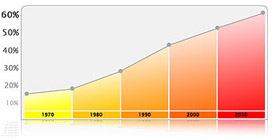
Obesity
DEFINITION
Worldwide, 2.8 million people die each year as a result of being overweight or obese. Being overweight or obese can lead to adverse metabolic effects on blood pressure, cholesterol and can result in diabetes. Being overweight or obese thus increases the risks of coronary heart disease, ischaemic stroke, diabetes, and a number of common cancers.

TRENDS
Between 1980 and 2008, the worldwide prevalence of obesity almost doubled. By 2008, 10% of men and 14% of women in the world were obese, compared with 5% of men and 8% of women in 1980. As a result, an estimated half a billion men and women over the age of 20 were estimated to be obese in 2008. In all WHO regions, women were more likely to be obese than men. The prevalence of overweight and obese individuals was highest in the WHO Region of the Americas (62% overweight in both sexes, and 26% obese).
HOW DOES SODIUM PARTICIPATE TO OBESITY?
Sodium consumption increases thirst
Thirst, which causes water or beverage intakes, is an unavoidable physiologic response to the ingestion of foods with high salt content. A linear increase in the intake of water or beverages has been demonstrated when someone is eating salty food. Drinking water doesn't increase the intake of calories, but drinking carbonated drinks certainly does.
Between 1977 and 2001, energy intake from sweetened beverages increased on the average by 135% in the United States. The net effect on energy intake was a 278 total kcal increase per capita a day. To burn the average increase of 278 kcal a day and avoid the development or worsening of obesity, one should walk for approximately 1 hour 10 minutes more or play tennis 40 minutes more, or vacuum 1 hour 10 minutes more each day than in 1977. The increased intake of salt has played an important role in the increase in the consumption of soft drinks and, hence, also in the increase of calories.
1g of Sodium in your body retains 100ml of water
High consumption of salt causes your body to retain water. Conversely, low consumption of salt can result in weight loss as it causes your body to expel water. It is interesting to note that many crash diets which boast quick weight loss rely on foods with little or no salt content.
SOURCE
The entire text of 'Trends' and 'How does Sodium participate to obesity?' come from an article by professors Heikki Karppanen and Eero Mervaala from the Institute of Biomedicine, Pharmacology, University of Helsinki, Helsinki, Finland, and Department of Pharmacology and Toxicology, University of Kuopio, Kuopio, Finland. Published in 2006 by Elsevier.
Article: "Sodium Intake and Hypertension"